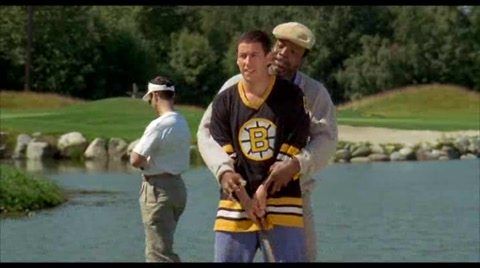
If you can relax your body, starting with your hands, you will hit better shots.
I’m just easing the tension baby! We all remember this line from Happy Gilmore, but to me this has been one of the most important concepts in developing my game. Tension in the body is very disruptive to a golfer.
Many of us grew up playing sports where aggression pays off. The coaches always stressed that you had to increase your intensity and give 110%. That might work in football, but in golf I find it’s the exact opposite. Calming yourself down, and allowing your body to be completely relaxed before hitting a shot is the key to success.
I’ve watched so many golfers with their drivers in hand ready to hit their tee shots. I see their muscles tensing all over the place. They are gearing up to hit that huge drive, and sadly they are often spraying the ball everywhere.
My contention is that the tension in their body is a combination of nervousness and the desire to hit the ball as hard as possible. When you can relax your body, you can make a much more fluid swing with proper tempo. That is when you can really start striking the ball!
I have heard quotes out there from Nicklaus and Hogan that you should hold the club like it’s a baby bird in your hands, and that you should be able to feel the club head throughout your whole swing. This all speaks to a golfer’s muscle tension. If you are gripping too tightly, and your upper body is not relaxed, then you can’t feel a thing in your swing. You will not be able to know where the club head is going, and it is likely that your tempo will be erratic. That is when major mistakes happen.
In my opinion, I feel that tension in your swing starts with your hands. When I began gripping the club lightly, I started to see much better results. It’s a very difficult concept to master though, sometimes you are more nervous than you realized in a round and your adrenaline is rushing. Your grip has become much tighter without you noticing. It happens to me all the time.
Dave Pelz speaks about this a lot in his books as the “Dead Hands” approach, and after reading them it really started to click for me. He says that the small muscles in your hands and forearms are what kill your touch on shorter shots.
This is absolutely true, and my short game did improve using this approach. I also found that when I started to use that technique on my full swing there was some dramatic improvement. I gripped my driver like it almost wasn’t even in my hands, and suddenly I was hitting it a bit farther and straighter. It’s because I was allowing my body to make a fluid motion, rather than forcing it with aggression.
Ernie Els is the embodiment of what I'm talking about. Does it look like he is trying to hit the ball hard? Quite the opposite, that’s why they call him the Big Easy. I bet his club head speed is around 120 mph with the driver, but it looks more like 80. Now there are a lot of things about his swing that are technically perfect, but what always stood out to me was that he always looked so relaxed. I’d bet you any amount of money he is not gripping that club very hard, and his whole body is completely relaxed before every swing.
The next time you are out on the range, start gripping the club as lightly as possible. Release all of that tension in your body. Waggle the club head slowly before each swing, really try and feel its weight in your hands. While you are in the middle of your swing try and keep that feeling, because if you can’t feel the weight of the club head any more it’s likely that you’ve tensed up too much.
I think focusing on this concept can help your game quite a bit. It will improve your tempo, and help deal with high-pressure situations on the golf course. Remember, it’s much easier said than done. There isn’t a golfer on the planet that doesn’t tense up due to nervousness and pressure. They key is to be cognizant of when it's happening, and try to release that pressure starting with your hands.
Remember, just ease the tension baby!
Other articles you might like:
Do you like what you read? Sign up for our newsletter
We care about the protection of your data Read our Privacy Policy